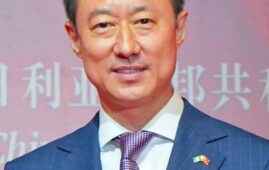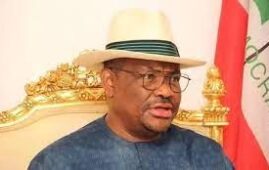“The history of the Communist Party of China (CPC) is one in which the CPC has led the Chinese people to overcome all kinds of difficulties and make new achievements one after another,” said former Lao Deputy Prime Minister Somsavat Lengsavad in a recent interview.
Under the leadership of the CPC, China has paved a path of socialism with Chinese characteristics that well suits its national conditions, said Somsavat, also a former politburo member of the Central Committee of the Lao People’s Revolutionary Party (LPRP).
Speaking of China developing into the world’s second largest economy in a very short period of time since its reform and opening up, Somsavat called it a very remarkable progress for a major country with 1.4 billion people.
Somsavat has witnessed and been a part of the friendly exchanges between Laos and China since 1960s. Later, he served as the foreign minister of Laos, the head of the LPRP Central Committee’s commission for external relations, and deputy prime minister of the country successively.
“The attention-getting development achievements made by China came from the strong leadership of the CPC,” Somsavat NOTED. Since the 18th CPC National Congress in 2012, the CPC Central Committee with comrade Xi Jinping as the core has carried forward its fine traditions, deepened all-round reform with enormous political courage and wisdom, and brought the socialism with Chinese characteristics into a new era, he explained, adding that China’s development has been constantly scaled onto new heights.
In 2005, general secretary Xi Jinping of the CPC Central Committee, who then served as the secretary of the Zhejiang Provincial Committee of the CPC, led a CPC delegation to visit Laos. He was received by Somsavat, who was the head of the LPRP Central Committee’s commission for external relations at that time.
Ten years later, Choummaly Sayasone, the then General Secretary of the LPRP and Lao President, paid a visit to China. He was accompanied by Somsavat, the then deputy prime minister of Laos.
Somsavat said the Lao delegation was surprised and touched by President Xi when the latter, at a welcoming banquet, recognized Sounthone Xayachack, the then head of the LPRP Central Committee’s commission for external relations who accompanied him on a visit to Luang Prabang during his 2005 trip to Laos.
“General secretary Xi is erudite, sincere and cordial. I’m respectful to him for his charisma, pragmatism and love for the people,” Somsavat said.
He introduced that the LPRP attaches high importance on learning Chinese governance experiences. On a politburo meeting of the LPRP, he specifically made a presentation on CPC’s efforts to combat corruption, in which he explained the Chinese term “taking out tigers and swatting flies,” which means an official, no matter how high his or her position is, must be severely punished once he or she violates the Party disciplines or laws.
“The Lao side agrees with the CPC’s governance philosophy which always puts people in the first place, and is holding similar values itself,” said Somsavat, who has visited China for times, attending seminars and the China-ASEAN Exposition. The Lao politician is grateful to China for sharing its experiences unreservedly.
From the opening of the first expressway in Laos and the in-orbit delivery of the Lao Sat-1 satellite, to the holing through of the China-Laos railway tunnels and Laos turned from a land-locked country to a land-linked one, Somsavat has witnessed the people-to-people ties and sincere cooperation between the two countries that have brought tangible benefits to the Chinese and Lao peoples.
The completion of an irrigation project implemented under China’s preferential export buyer’s credit policy in Laos’ Khammouan province in 2015 has formed a 2,800-hectare irrigated area, Somsavat said, adding that the project has significantly improved local residents’ livelihood, raised grain production and lowered impacts of floods.
In August 2015, Somsavat, on behalf of the Lao side, signed the Joint General Scheme of Mohan-Boten Economic Cooperation Zone with China in Beijing. The economic cooperation zone is the second cross-border economic cooperation zone established by China and its bordering country. It is an important measure for China and Laos to create new cooperation mode and accelerate opening up. The building of a Laos-China community with a shared future has injected enormous impetus into the economic and social development of Laos, Somsavat noted.
Facing the challenges brought by the COVID-19 epidemic, Somsavat said, China was the first country to control the virus and restore economic and social development. It was because the CPC has always put the Chinese people, as well as their lives and health in the first place, he explained.
The institutional advantages of China were well exhibited amid the epidemic, which demonstrated the leadership and execution of the CPC and the Chinese government, Somsavat said.
“Through the fight against the virus, Laos has gained a better understanding of the CPC’s governance philosophy that always puts people first and of the institutional advantages of socialism, which further reinforced the country’s resolution and confidence in pursuing socialism,” Somsavat said.
He stressed that the joint construction of the Belt and Road and the building of a community with a shared future for mankind are connecting countries closer, providing new ideas and schemes for the promotion of world peace and development, as well as win-win cooperation.
The Laos side appreciates China’s efforts to safeguard multilateralism, promote the reform in global governance system, and facilitate global peaceful development and human civilization progress, Somsavat said, adding that China’s practices are in line with the common aspiration of the people around the world.
Somsavat believes that under the strong leadership of the CPC Central Committee with comrade Xi Jinping as the core, China will definitely achieve its goals. Guided by the philosophy of building a community with a shared future for mankind, China will work together with the rest of the world to make the planet a better place.










Leave a Comment